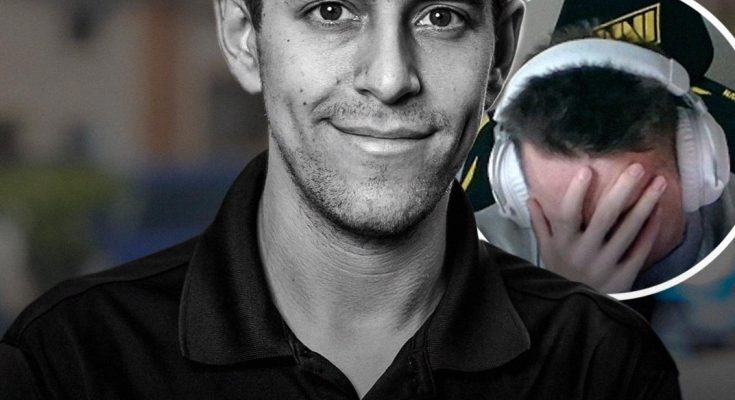Whispers of ignored warnings, cryptic messages, and a chilling final livestream now swirl around the untimely death of the young chess prodigy — a tragedy that’s raising far more questions than it answers.
The world of professional chess has been shaken to its core after the shocking death of one of its brightest stars — Daniel “Danya” Naroditsky, a beloved American grandmaster and commentator, was found lifeless on his couch.
The heartbreaking discovery came on Sunday, October 19, 2025, but the emotional aftershocks are still being felt worldwide.
Found on the Couch With the TV Still Playing
The tragic scene unfolded when a close friend and fellow Grandmaster, Oleksandr Bortnyk, went to check on the 29-year-old after Naroditsky stopped answering calls and messages. What he found was heartbreaking.
Bortnyk arrived at Naroditsky’s home, noticed the television was still on, and received no answer. Letting himself in, he made a harrowing discovery: Naroditsky was dead.
Bortnyk later revealed the traumatic moment during a Twitch livestream, saying, “I found him dead on the couch.”
‘I Love You So Much… I’m Happy My Last Words Were Supportive’
Bortnyk’s voice cracked with emotion as he recounted the final time they spoke. Fighting back tears on stream, he remembered telling Naroditsky, “Danya, don’t worry about anything. I love you so much. You are just the best.” He added, “I’m happy my last words were supportive.” Calling Naroditsky his “best friend,” Bortnyk vowed to never forget him.
Alongside him during the grim visit was Peter Giannatos, of the Charlotte Chess Center, another close confidant of Naroditsky. The pair had gone together, sensing something was wrong.
Cryptic Warnings and Furious Accusations Follow
As grief poured in, so did alarming questions about the circumstances leading to Naroditsky’s death — and a prominent voice raised them publicly: former World Chess Champion Vladimir Kramnik.
In a blistering pair of posts on X, Kramnik expressed grief but also clear suspicion, revealing that he had tried to raise the alarm days earlier.
“What exactly happened?” Kramnik asked, posting on October 20. “Because I received this two days ago from a friend of mine chess fan, and at least did what I could to warn people to do something urgently in my posts. To those who prefer blaming and shaming instead of helping. Awfull tradegy, hope properly investigated [sic].”
Kramnik included screenshots of texts and an audio note, attempting to prove his efforts to get help for Naroditsky before it was too late.
In a separate post from the same day, Kramnik didn’t hold back. “Too high price paid, but if I was the only person shouting about obvious long term problems of Danya becoming alarming, requiring urgent measures from people around, while ‘friends’ only cared about hiding it and erase evidence, its rotten to the core [sic].”
The Accusation That Changed Everything
It was early 2024 when Russian former world champion Kramnik stunned the chess world by publicly accusing Naroditsky of cheating — specifically, of using a second screen to consult chess engines during livestreams.
The allegation, made repeatedly across posts, articles, and even a GoFundMe campaign, struck at the core of Naroditsky’s identity as a trusted public figure and educator. Though no evidence was ever produced, the damage was immediate and profound.
Naroditsky, visibly shaken, went public in his defense — not just against the charge, but against the silence from those in power.
He described the accusation as a career-destroying offense for any grandmaster, but argued that, in his view, the actions of Kramnik and those who supported him were morally even worse than the alleged cheating itself.
He added that the emotional toll from the controversy was overwhelming — and he didn’t mince words when describing his state of mind. Naroditsky noted that the pressure of being left to defend himself without institutional support made him feel isolated, humiliated, and exposed to public judgment.
A Year in the Shadows
The allegations hung over Naroditsky’s final year, casting a shadow that no public rebuttal could fully erase. Though no formal investigation found wrongdoing, the damage had been done — not just to his reputation, but to his mental health, which he had spoken about with increasing openness.
He admitted to battling depression and suicidal thoughts, and many now believe that the public scrutiny, especially from someone as high-profile as Kramnik, became an unbearable emotional weight.
While there is no confirmed link between the feud and his untimely death, the timing has reopened conversations about accountability, mental health, and how the chess world protects its own — or fails to.
A Legacy of Brilliance — and an Outpouring of Grief
It was the Charlotte Chess Center, a place where Naroditsky’s love for the game took root and thrived, that publicly confirmed the heart-wrenching news on October 20.
In a statement shared on behalf of his family, the center wrote that Naroditsky’s passing was both sudden and deeply sorrowful, describing him as a gifted player, dedicated teacher, and cherished figure in the chess world. They also requested privacy for the grieving family during this profoundly difficult time.
Though his life was cut tragically short, Naroditsky’s achievements paint the portrait of a once-in-a-generation talent. A former World Junior Champion, Naroditsky earned a gold medal in the Under-12 Open section of the 2007 FIDE World Youth Championships, and at just 17, he captured the U.S. Junior (Under-20) Championship title in 2013.
He played in five U.S. Championships, published his first book — “Mastering Positional Chess” — at the age of 14, and wrote a popular column in Chess Life for six years.
But it wasn’t just his accomplishments over the board that won him admiration — it was his magnetic personality, devotion to teaching, and ability to connect with fans around the globe.
‘He Tried to Do What He Could for Chess’
Grandmaster Hikaru Nakamura, speaking on a livestream following Naroditsky’s death, placed him among the pioneers of chess streaming — a tight-knit generation that reshaped the public image of the game.
“He loved streaming, and he loved trying to be educational. The chess world is very grateful,” Nakamura said. Nakamura went on to say that Naroditsky tried doing everything he could for chess. He also admitted, “I am a bit of a mess obviously.”
The sorrow echoed across platforms. GM Bortnyk, who discovered Naroditsky’s body, also streamed a message to his followers. “He was a very talented chess player. But more, he was a very good guy. Very kind guy. He was a good friend.”
The Chess World Reels — and Demands Answers
Across social media, tributes flooded in from players, fans, and friends alike. But beneath the outpouring of love is a deep unease. Why did no one intervene sooner? Could this tragedy have been prevented?
As of now, authorities have not released an official cause of death. One thing is clear: the chess world has lost not just a grandmaster — but a soul deeply loved and now mourned, whose final days remain shrouded in silence.



